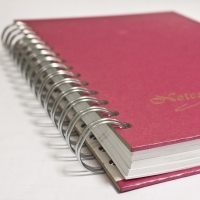How Software Testers Can Benefit from Keeping a Notebook

Software testing is an intellectually challenging activity. Our effectiveness as testers depends on the clarity, creativity, and organization of our thinking.
However, teaching yourself to think better is an interesting challenge—one that's not as straightforward as, say, becoming a better runner. Many people find keeping a notebook is helpful.
Johanna Rothman mentions the usefulness of a notebook in a personal context—specifically, undergoing long-term medical treatment. However, it's a tool that's long been used in a professional context across many different fields.
Artists, writers, and soldiers commonly use notebooks or journals; engineers and scientists are often required to have them and to organize them in a prescribed format so that they can be referred to in legal matters. Among other recommendations, James Bach mentions recording your thoughts in a notebook as part of a software tester's daily practice.
While an electronic journal seems like the most obvious choice for someone in the technology industry, paper notebooks never run out of power, don't take up space on your screen, and aren't vulnerable to disk crashes.
A pen is inherently flexible—it's just as easy to draw diagrams, pictures, and symbols as it is to write text. Too, writing in a notebook is a pleasantly tactile experience, a feature that's sorely absent from the increasingly touchscreen-based devices of today.
Keeping a notebook is part organization and part reflection. It can help you recall specifics that are mentioned to you—phone numbers, addresses, tasks, and so forth—and this alone would be reason enough to use it. Many people find that writing things down makes them easier to remember later, even without referring back to their notes.
Notebooks are particularly helpful in meetings, where they not only let you capture the key points but they also give you something useful to do that will help you avoid falling asleep. Most importantly, tracking your own activities—what you're up to each day, what progress you've made, what you've tried to solve a given problem—will give you the chance to reflect on your work later.
A notebook can provide you with an accurate historical account of what's transpired over the life of a project or engagement. Reviewing your notebook lets you pick up on patterns, trends, and insights that are relevant to your work, and seeing what you were thinking or doing at each point of tackling a challenge may let you find ways to improve your approach next time.
Do you keep a notebook or journal? If so, how has it improved your life?

